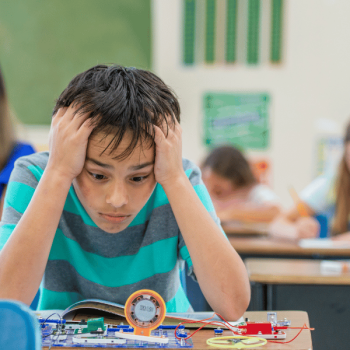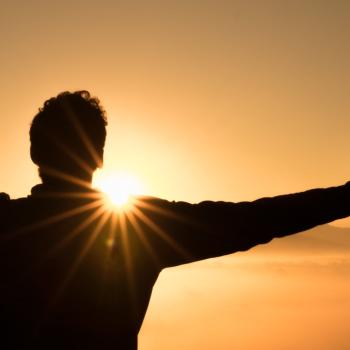In the grouchy aftermath of interrupted nap time, all my three-year-old wanted to do was bury his head in my chest. My Grandma sat next to me, and trying to make him smile, she put her hand out to touch his. He rejected it, turning his face away, pulling his hand in to tuck it in the unreachable safe between his body and mine.
When my Grandma gave up trying to get his attention, he decided he wanted her back, and without looking at her, he stuck his hand out behind him, and extended one index finger in her direction. He looked out of the corner of his eye to see how she'd take it.
She was on to him now, and extended her knobby index finger in his direction, holding it there for him to meet.
He leaned towards her, and their fingers touched, like Drew Barrymore and ET; like God creating Adam. As long as they could meet mutually in the free space between them, he was comfortable. But when she hooked his finger with her own, he pulled it back again, not wanting to be kept against his will.
My grandma smiled knowingly. "One day, little man," she said, "you will reach out your finger, and you won't get it back."
For now, being three years old, it means more to him to assert his independence than to make inseparable bonds. But Grandma was acknowledging the hold that eventually, if we're lucky, we allow others to take on our lives when we create families, make promises to others, and fulfill the obligations that these promises entail.
Making plans and promises can be a scary thing to do, because there is always the possibility that we will fail at upholding our end of the bargain.
Sometimes I schedule activities, and then forget to look at my calendar where I wrote them down. Which is how it happened last Friday that I scheduled a dinner with friends on the same night I was supposed to head out of town for the weekend.
I emailed my friend who does all the planning, and told her how disappointed I was with myself, because, really, it gets irritating at times to be so consistently thoughtless. "I hate myself," I wrote, for doing this sort of thing to them when I know it's difficult to coordinate everyone's schedules. We all have kids and work, and this dinner has been two months in the making.
My friend wrote back, that I should not go on hating myself, however, because "Friends extend grace to one another."
I might have withdrawn from the group knowing that I'd goofed up long-held plans. An embarrassed person's first impulse is to hide her head in the sand. We want to disappear. Likewise, when I sin, I want to hide from God and others, rather than to go and ask for forgiveness.
Conversely, I might have been ejected from the group by less understanding friends. When we are injured by others, we also want to withdraw and protect ourselves.
But any time the soul chooses to isolate rather than to embrace, it is the ego. And the ego is the enemy of human relationships. It allows us to build imaginary castles around ourselves, to define our own realities, to carry on relationships behind a veil where any time the demands of others become too much to bear, we can retract ourselves, unplug, and return to the privacy and independence we hold so dear.
Only grace allows us each to extend a hand towards the other.
Forgiving others' debts, and asking for forgiveness both require a reaching out, or a going forth. There is a meeting that needs to take place, which is one of the reasons Catholics confess their sins to a priest. We go forth. We make a human contact. We speak, not into a void, but to a person, who represents Christ to us. The experience of Christianity is always personal. It's always tactile. It always brings spiritual realities into physical human contact with believers. We reach out to experience God, and he sends us real people who listen to and absolve us. And the reality of our forgiveness becomes clearer, because it has not just taken place in our minds, but it has been shared between two living, breathing people, in the same room with one another.
In the digital age more than ever, the physical presence of other people in my life feels miraculous, from the anonymous priest waiting behind a screen to hear my Confession, to the child who jumps on me to wake me out of bed. The practical needs of others draw me out of my mind and into a more grounded reality. This is part of what community accomplishes.
My interior life demands a witness, so that what happens inside me is not just a reality of my own making, perhaps even a false reality. The interior life must be tried against the witness, perception, and experience of other people, or frankly, it's too easy to delude ourselves.
After the shooting in Aurora, it's easy for observers to shake our heads and say that the shooter was living in a world of his own making. His isolation, his loneliness, to which so many people testified, speaks for itself. "He was a loner." None of his neighbors knew anything about him. What might have happened if just one person had decided that letting him continue in his path of loneliness and isolation was not good enough. What if someone had reached out to him, and extended the grace of testing their reality against the constructed and false one in which he was living? What if someone had been able to identify a mental illness before its disastrous manifestation?
In times like these, when the temptation is to hole up and protect our own, isolating ourselves from civilization even more is certain only to compound our communal loss. We have an obligation to extend grace to one another, to people who are not expecting it—to extend it freely, with maturity, not fearing to be kept or destroyed. When our egos win, we all lose.
12/2/2022 9:05:39 PM





